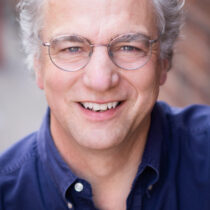Magazine

Sing to the Colors
For nearly 20 years, James Tobin has been writing about the University’s history. Many of his stories are now available in a new book, Sing to the Colors. We sat down with him to talk about research, collections, and even finding love at the library.
By Lara Zielin
How did you get started writing about U-M history?
For many years I worked as a journalist, and I even covered U-M for the Detroit News. But it wasn’t until I struck out on my own as a full-time freelancer that I began writing about U-M history. My first piece was for Michigan Today about the playwright Avery Hopwood. After it came out, I pitched the editor on a monthly U-M history piece.
Then, as plans for U-M’s bicentennial [celebrated in 2017] began to take shape, a friend and member of U-M’s staff, Kim Clarke, approached me about a new digital publication called the University of Michigan Heritage Project. I began writing longer-format pieces there, too.
All told, I’ve done more than 130 pieces for Michigan Today, and around 50 for Heritage.
But the new book is more than just a compilation of some of your history stories, right?
Right. I wrote a pitch for U-M Press, which went to Fran Blouin, the former director of the Bentley Historical Library. He told me republishing the stories wouldn’t be enough. Readers would want to know what I had learned along the way. Where had I been troubled or inspired?
He was right, so I stepped back and thought about my family’s love for the university and my complicated relationship to it. I wrote several first-person essays that try to tie the stories together, plus two new pieces not published before.
Your friendship with Fran Blouin speaks to your longstanding relationship to the Bentley. Can you tell us how long you’ve been using the archive?
I started researching at the Bentley as an undergraduate at U-M in the 1970s. I was a reporter for The Michigan Daily, and I needed the Bentley to give me historical context for some of my stories.
As an undergraduate, the reference archivists were always so helpful. But learning the protocol around the archives was a different story. For example, at one point I went to use the men’s bathroom and I took my book with me. I grew up thinking you read in the bathroom! When I returned to the table, a reference archivist asked me, “Is that our book you’ve been dragging all over the library?” I didn’t make that mistake again.
I wound up researching my honors thesis at the Bentley and seminar papers in graduate school. I also crossed paths with my wife there. Fran recruited her to join U-M’s master’s program in archives administration. I showed up for the first day of a history class in 1978, and she was sitting in the back row.
Didn’t your parents meet and fall in love at U-M too?
Yes, my parents had a classic Michigan romance going to J-Hop, the central social event of the year. I write about that in the book, and how my mom spoke about it with such respect and nostalgia. My dad went off to WWII then came back to U-M to attend the Law School. Both my daughters went to U-M too. As I say in the book, I can see my life as a little green vine growing up and around the giant oak of U-M.
How do you find your story ideas?
If I spend a day at the Bentley, I’ll often stumble on something that looks interesting to me. As I go through this box or that box, I see things that appeal to me and I will want to go deeper. I’ll also ask the Bentley reference archivists for help. I’ve always had trouble coming up with good story ideas, but the exception has been U-M history. I can always find a story I want to write about.
What’s your favorite thing in the collections at the Bentley?
Going through the student scrapbooks from the 19th century, you just have that feeling of being transported to a different time. I love looking at things like the graduation programs and dance cards. I get a big kick out of handling materials—I find myself totally absorbed the way I feel when I’m reading a great novel. Just rapt.
James Tobin is a professor of Media, Journalism and Film at Miami University in Oxford, Ohio. Educated at the University of Michigan, where he earned a Ph.D. in history, he spent 20 years as a newspaper reporter and freelance writer. Among his books are Ernie Pyle’s War: America’s Eyewitness to World War II (Free Press, 1997), and The Man He Became: How FDR Defied Polio to Win the Presidency (Simon & Schuster, 2013). He has also written three books for children.
